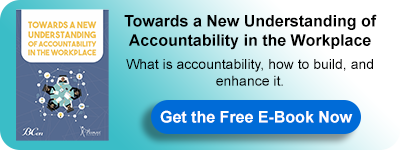Why Some Employees Are Not Accountable?
Some people seek being accountable and feel a sort of satisfaction of being (or seen) accountable as this fulfils some of their higher human needs (in Maslow’s pyramid) like Self Actualization. Other people feel afraid of this word especially in the work environment as it’s probably will include either more responsibilities or more blame. To answer this question we may need first to go backward and ask the following question:
Is Accountability a Choice or Innate?
From the meaning of accountability involves a motive or desire to answer for our action. While desire or motive is intrinsic, yet, across organizations Accountability is considered a skill that could be developed. Therefore, it involves making the right choices. Of course the higher the motive the better, yet, the more the skill is developed it becomes more of a strength, making people see the positive outcome of their choices and actions, which in turn breeds more accountability thus more intrinsic motivation is developed as well. Accountability depends on the person’s choice to answer for his/her actions. As Viktor Frankl an Austrian neurologist and psychiatrist puts it “Everything can be taken from a man but one thing, the last of the human freedoms – to choose one’s attitude in any given set of circumstances, to choose one’s own way” Therefore no one can hold us accountable if we do not ourselves accountable. If we do not make that choice.
There are some reasons that hinders the employees’ tendency towards holding accountability.
1. Fear of blame
Another reason for employees not being accountable is their fear of being blamed. If there is accountability, a lot has to be said about “admitting mistakes”, and if there are mistakes then there must be blame! Well, accountability calls for the exact opposite.
2. The Fundamental Attribution Error
The fundamental attribution error (FAE) is our tendency to explain someone's behavior based on internal factors, such as personality or disposition, and to underestimate the influence that external factors, such as situational influences, have on another person's behavior. We might, for example, explain the fact that someone is unemployed based on his character, and blame him for his plight, when in fact he was recently laid off due to a sluggish economy. Of course, there are times when we're correct about our assumptions, but the fundamental attribution error is our tendency to explain the behavior of others based on character or disposition. This is particularly true when the behavior is negative.
When it comes to explaining our own behavior, we're more likely to do just the opposite. In other words, we have a tendency to explain our own behavior in terms of external, situational influences. Why? One reason is that we are familiar with our circumstances. If we are laid off from our job and become homeless, we know that the poverty we find ourselves in is not the result our character, but the result of our circumstance. When we see another person homeless, we see only the end result, and we make an assumption about what led to it.*
Within organizations, FAE causes everything from arguments to firings and ruptures in organizational culture. In fact, it’s at the root of any misunderstanding in which human motivations have the potential to be misinterpreted.
*https://study.com/academy/lesson/fundamental-attribution-error-definition-lesson-quiz.html
For more about this topic, download our latest book "Towards a New Understanding of Accountability in the Workplace" for FREE:
